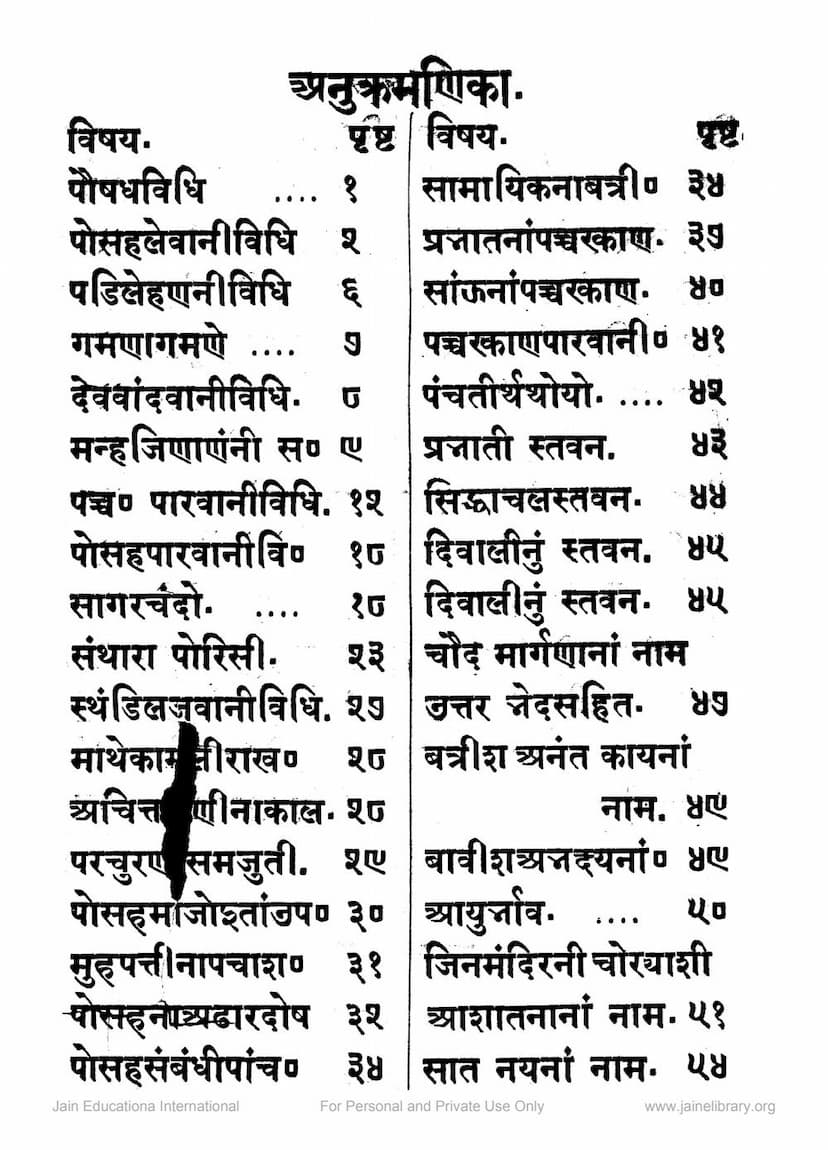Paushadh Vidhi
Added to library: September 2, 2025

Summary
This document, "Paushadh Vidhi" by Shravak Bhimsinh Manek, is a comprehensive guide to performing the Jain observance of Paushadh, a period of fasting and spiritual discipline undertaken by lay followers (Shravaks). The text, written in Gujarati, outlines the rituals, rules, and principles associated with this important practice.
Here's a breakdown of the key elements covered in the document:
1. Introduction to Paushadh:
- Definition: Paushadh is explained as a practice that upholds and strengthens one's religion (Dharma).
- Significance: It is the eleventh vow among the twelve vows of a Shravak.
- Timing: It is typically observed on auspicious days like Ashtami and Chaturdashi, and can last for four or eight prahars (parts of the day/night).
2. Types of Paushadh: The text details four main types of Paushadh:
- Aahar Paushadh (Dietary Paushadh): This involves fasting or limiting one's food intake. It can be observed fully (e.g., Chovihar - abstaining from food and water for the entire duration) or partially (e.g., Tivihar - abstaining for a portion, or Ayambil, Ekasan).
- Sharir Satkar Paushadh (Body Care Paushadh): This involves refraining from decorating or indulging in activities like bathing, anointing the body, etc.
- Brahmacharya Paushadh (Celibacy Paushadh): This emphasizes adherence to chastity.
- Avyapar Paushadh (Business/Worldly Affairs Paushadh): This involves abstaining from all sinful or worldly occupations.
While theoretically there are eight types (four fully and four partially), the current tradition primarily focuses on Aahar Paushadh, with the other three being observed fully.
3. Rituals and Procedures: The book meticulously describes the step-by-step procedures for observing Paushadh, including:
- Morning Routine: Waking up early and performing spiritual practices.
- Seeking Permission: Approaching a spiritual preceptor (Guru) to formally undertake the Paushadh. This involves requesting permission to perform rituals like "Pratilekhan" (cleaning of utensils and clothing with a specific method) and "Dev Vandan" (worship of deities).
- Undertaking Paushadh: The specific vow-taking ceremony ("Paushadh Daanak") is detailed, including the exact Sanskrit/Prakrit phrases to be recited. The duration of the Paushadh is confirmed at this stage.
- Samayik: The procedure for observing Samayik (a period of meditation and introspection) is also outlined, often performed in conjunction with Paushadh.
- Pratilekhan (Cleaning): The specific method of cleaning various items like the Muhapatti (mouth cloth), Charvalo (broom-like cloth), etc., using a prescribed number of "bols" (syllables or mantras) is described. This emphasizes the importance of non-violence even in cleaning.
- Dev Vandan (Worship): The correct way to perform worship, including bowing, reciting specific mantras and hymns, and performing circumambulations, is explained.
- Paushadh Parvana (Breaking the Fast): The ritual for ending the Paushadh is detailed, including the specific prayers and actions required. This often involves consuming a limited amount of food or drink according to the specific vow.
- Santhara Porisi: This section details a specific observance related to the last part of the night, involving particular prayers and practices.
4. Important Considerations and Rules: The text emphasizes adherence to specific rules to avoid "doshas" (faults) and "ativicharas" (infringements) during Paushadh and related practices. These include:
- Avoiding attachment: Not to desire special food for Paushadh or to prepare elaborate meals for the day after.
- Non-violence: Strict adherence to principles of Ahimsa in all actions, from cleaning to eating.
- Speech: Avoiding gossip, discussions about worldly affairs, and any form of negative talk.
- Mindfulness: Keeping the mind focused on spiritual practices and avoiding distracting thoughts.
- Purity: Maintaining purity of body, mind, and speech.
- Specific details: Rules about the use of water (time-bound), handling of belongings, and interactions with others are provided.
5. Additional Information: The book also includes:
- Lists of various categories: Names of different types of souls, lifespans of various beings, categories of edibles and non-edibles, virtues, sins, etc.
- Doxologies and Hymns: Various devotional songs and hymns (Stavans) are included, such as "Sagar Chando," "Panchtirth Stavan," "Shikharachal Stavan," and Diwali Stavan.
- Explanations of Jain Concepts: Brief explanations of concepts like the Seven Nayyas (modes of logic), Four Nidhanas, Eight Madas (prides), and the fourteen stages of the soul.
Overall Purpose: "Paushadh Vidhi" serves as a practical manual for Jain followers wishing to observe the Paushadh vow with the correct rituals and understanding. It highlights the importance of discipline, purity, and non-violence in spiritual practice, guiding the devotee through each step to achieve the full spiritual benefit of this observance. The author, Shravak Bhimsinh Manek, has compiled this text to preserve and disseminate the traditional methods of observing Paushadh.